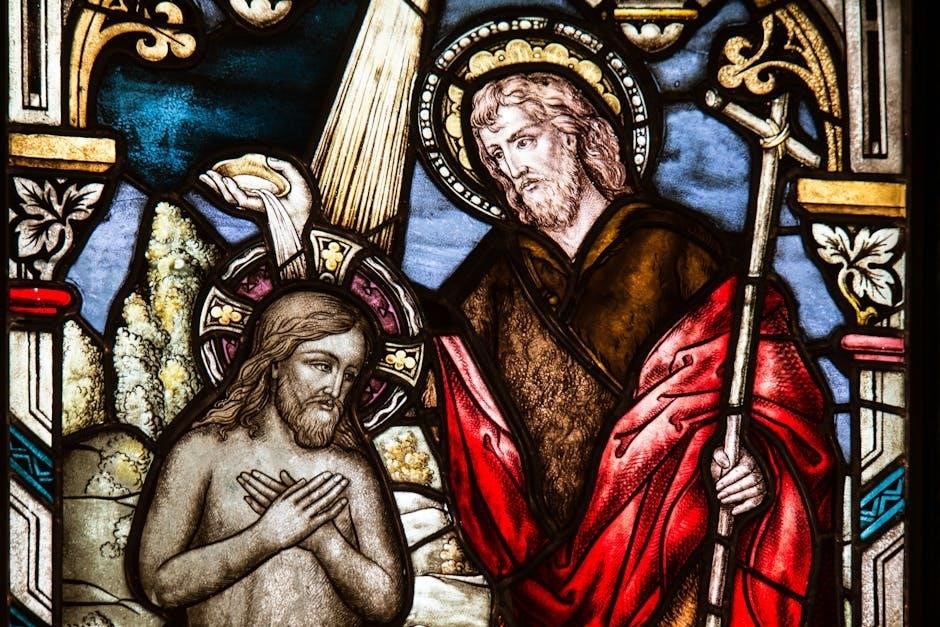The 116 Hebrew Names of God reveal His divine attributes, promises, and character, offering profound spiritual depth. Each name, rooted in Scripture, provides insight into God’s nature and covenantal relationship with humanity.
Overview of the Names
The 116 Hebrew Names of God encompass a vast array of titles, each carrying unique theological and cultural significance. These names are derived from various Hebrew words and phrases found in Scripture, reflecting God’s attributes, roles, and interactions with humanity. They include primary names like Yahweh (Jehovah) and Elohim, as well as secondary names such as Adonai and El Shaddai, which highlight specific aspects of His nature. Additionally, there are minor and major Jehovah names, combining Yahweh with descriptive terms to emphasize His character, such as Jehovah Jireh (the Lord Will Provide) and Jehovah Rapha (the Lord Who Heals). These names not only deepen understanding of God’s multifaceted personality but also provide a framework for worship, prayer, and spiritual growth. Studying these names offers a richer appreciation of God’s covenantal promises and His relationship with Israel and the world.

Historical Background
The 116 Hebrew Names of God are deeply rooted in ancient Jewish tradition and Scripture. The names originated in the Hebrew Bible, with the earliest appearing in Genesis. Over time, these names evolved, reflecting Israel’s growing understanding of God’s nature and covenantal relationship. The use of specific names often corresponded to historical events, such as the Exodus, where Yahweh became central, symbolizing divine deliverance. Post-exilic periods saw a shift toward using titles like Elohim and Adonai, emphasizing God’s transcendence and sovereignty. Rabbinic scholars later classified and studied these names, uncovering their theological richness. This historical journey highlights how each name captures a unique aspect of God’s character, providing a timeless framework for worship and study. Understanding their origins enriches one’s appreciation of Scripture and the Jewish faith’s enduring connection to the Divine.

Major Categories of Hebrew Names of God
The 116 Hebrew Names of God are categorized into Primary, Secondary, and Minor and Major Jehovah Names, each highlighting distinct attributes, roles, and divine expressions in Scripture.

Primary Names
The Primary Names of God are foundational, representing His essential nature and covenantal relationship with humanity. These names include Yahweh (the most sacred name, revealed in Exodus 3:15), Elohim (highlighting God’s power and creation), and Adonai (emphasizing Lordship and authority). Each name carries profound theological significance, offering insights into God’s character, such as His faithfulness, justice, and mercy. Yahweh, for instance, underscores God’s personal and eternal covenant with His people, while Elohim focuses on His creative and sovereign power. These names are central to understanding God’s interaction with humanity and are frequently used in both the Old Testament and Jewish tradition. By studying these Primary Names, one gains a deeper appreciation of God’s multifaceted nature and His divine plan for humanity.
Secondary Names
Secondary Names of God complement the Primary Names by further revealing His attributes and roles. Names like El-Shaddai (the All-Powerful One), Jehovah Jireh (the Lord Will Provide), and Jehovah Rapha (the Lord Who Heals) emphasize specific aspects of God’s nature. These names often appear in specific biblical contexts, such as El-Shaddai in Genesis, linking to God’s covenant promises. Jehovah Jireh highlights God’s provision, as seen in Genesis 22, while Jehovah Rapha underscores His healing power. These Secondary Names enrich the understanding of God’s character, showcasing His faithfulness, mercy, and care for His people. They provide deeper insights into His divine attributes and His active involvement in human history. By studying these names, believers gain a more nuanced appreciation of God’s multifaceted nature and His relational engagement with humanity throughout Scripture.
Minor and Major Jehovah Names
The Minor and Major Jehovah Names are classifications within the 116 Hebrew Names of God, each emphasizing unique aspects of His character. Minor Jehovah Names focus on specific attributes or roles, such as Jehovah Jireh (the Lord Will Provide), Jehovah Rapha (the Lord Who Heals), and Jehovah Shalom (the Lord Is Peace). These names often appear in specific biblical contexts, highlighting God’s direct intervention in human affairs. In contrast, Major Jehovah Names carry broader theological significance, such as Jehovah Nissi (the Lord My Banner) and Jehovah Tsidkenu (the Lord Our Righteousness). These names underscore God’s eternal and universal attributes, reflecting His covenantal promises and redemptive plan. Together, Minor and Major Jehovah Names provide a rich tapestry of God’s multifaceted nature, inviting deeper exploration of His character and divine purposes. They serve as powerful tools for worship, prayer, and understanding God’s relational engagement with humanity.

Theological Significance of the Names
The 116 Hebrew Names of God hold profound theological significance, revealing His character, promises, and divine nature. Each name offers insight into God’s relational and covenantal engagement with humanity, deepening faith and understanding.
Understanding the Nature of God
The 116 Hebrew Names of God provide a rich tapestry for understanding His divine nature. Each name reveals specific attributes, such as Elohim (God as Creator), Adonai (Lord), and Jehovah (the self-existent, relational God). These names highlight God’s omnipotence, mercy, and covenant faithfulness.
Names like Jehovah Sabaoth (Lord of Hosts) emphasize His sovereignty and divine authority, while Jehovah Rapha (the Lord who heals) reflects His compassionate care. Studying these names deepens one’s grasp of God’s multifaceted character, fostering a more personal and reverent relationship with Him.
By exploring these names, believers gain insights into God’s holiness, justice, and love, ultimately enriching their worship and trust in Him. This theological exploration invites a deeper connection with the divine, revealing God’s infinite wisdom and grace. The names serve as a bridge to understanding His eternal and unchanging nature, inspiring awe and devotion in those who seek Him.

Roles and Attributes
The 116 Hebrew Names of God intricately describe His divine roles and attributes, providing a comprehensive understanding of His character. Names like Elohim highlight God as the all-powerful Creator, while Adonai emphasizes His lordship and sovereignty. Jehovah, the most sacred name, underscores His eternal and self-existent nature, revealing a God who is both relational and covenantal.
Other names, such as Jehovah Jireh (the Lord who provides), Jehovah Rapha (the Lord who heals), and Jehovah Shalom (the Lord of peace), illustrate His roles as Provider, Healer, and Source of peace. These attributes demonstrate God’s active involvement in human lives, showcasing His mercy, justice, and love.
Through these names, the Hebrew Scriptures paint a vivid portrait of God’s multifaceted character, inviting believers to reverence and trust Him deeply. Each name serves as a reminder of His faithfulness and the unique ways He interacts with humanity, reinforcing His divine authority and loving care.

Cultural and Historical Context
The 116 Hebrew Names of God are deeply rooted in Jewish tradition and Scripture, reflecting God’s interaction with His people across history. These names evolved over centuries, shaping both Jewish and Christian theological frameworks.

Development Over Time
The 116 Hebrew Names of God have evolved over centuries, reflecting Israel’s growing understanding of God’s nature and covenantal relationship with His people. Early names like El Shaddai and Elohim emerged in the patriarchal period, emphasizing God’s power and creation.
The Exodus marked a pivotal shift, introducing Yahweh (LORD), a name central to Israel’s identity and covenant. During the monarchy and prophetic eras, names like Adonai and Eloheinu highlighted divine authority and redemption.
Post-exilic periods saw the rise of more abstract and compound names, such as Jehovah Jireh and Jehovah Rapha, underscoring God’s providence and healing. This development reveals how each generation expressed its unique experiences and theological insights, enriching the tapestry of God’s revelation;

Influence on Jewish and Christian Thought
The 116 Hebrew Names of God have profoundly shaped Jewish and Christian theology, worship, and spirituality. In Judaism, these names are central to understanding God’s attributes and covenantal promises, often studied in Scripture and liturgy.
Christianity adopted many of these names, integrating them into its doctrine of God’s nature and Trinity. Names like Yahweh (LORD) and Elohim (God) are foundational in both traditions, while compound names like Jehovah Jireh (The Lord Will Provide) emphasize divine provision and grace.
These names have inspired hymns, art, and devotional practices, fostering a deeper connection with God. They continue to guide believers in exploring His character, reinforcing faith and trust in His promises across generations.
